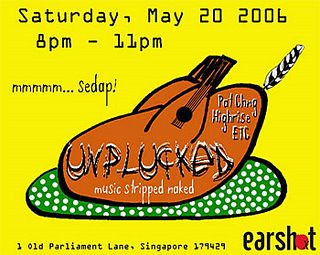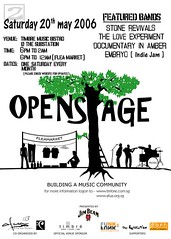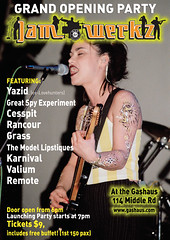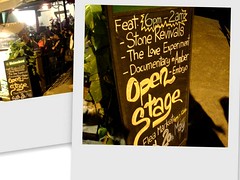Gigs, Neil Gaiman, Pseudo-Postmodernism, Meaninglessness and Apologetics
Right. Now that there's been time to do abit of housekeeping, what with the ARPC church camp and youth camp, here's a post from a month ago (21 May 2006):
A smörgåsbord of gig offerings last night:
Unplucked featuring Pat Chng, highrise and ETC at Earshot Cafe and Nat's naked fowl with a feather in her butt,
Openstage 2 showcasing Jim Beam girls in white cowboy hats, Documentary in Amber, Love Experiment and The Stoned Revivals at Timbre,
a rock bash for the Jamwerkz Opening at Gashaus and some sweltering kiddy moshing at IJ Studios, Gordon Industrial Building. So some thoughtful prioritising had to be done.
Then later...early in the cool dark morning, when the screech of cicadas had taken over from the wail of electric basses, we were seated in a line along the curb, spotlit by incandescent street lamps, doing coin tricks to prove we could still walk in a straight line thankyouofficer, peeling wet labels off empty Hoegaardens and setting them alight with snippy Zippos, talking about how it felt to hear some part of your life immortalised in someone's songs and about setting up record labels even as Cafe Cosmo was set to run her farewell lap in the coming week.
Then still later, when heady perfume of night flowers had grown faint in the tentative light and there was an expectant hush as the world gathered itself up for the new day ahead, I was restless and anxious to get back to my postmodernist readings for the seminar next month.
So after some quick shuteye and Chris' sermon at the ARPC service at Kuo Chuan Secondary, we found ourselves tucked away in a nice quiet corner after lunch, with Neil Gaiman between us.
Neil Gaiman's a particularly pleasant introduction to popular postmodern literature. Before Magic The Gathering and the advent of teenage acne, my childhood weekends were spent among the shelves of Comics Mart in Serene Centre, surreptitiously (because I lacked the years and the dollars to purchase them) reading "Black Orchid" and "The Sandman" and marvelling at Dave McKean's fab cover and divider graphic art that were certainly not the usual stuff of primary-coloured DC Comics. (Without the enlightening benefit of the internet then, I also assumed that I was Neil Gaiman's only fan. This assumption was put to bed, authoritatively, by the snaking queues at his book signings in Singapore last year.)
Gaiman's fruitcake mix of the mundane and the fantastical, giggly horror, mystical deception, blatant mystery, nonchalant murder, unconscious magic, screwball comedy, karaoke death songs, romance, maggot-hacking ghosts, divine dysfunction, cuddly scary birds, ancient grudges and alcoholic gods makes for a fine Sunday afternoon book, entertaining understated British humour and strong characterisation baked in a cheeky winking postmodernist vehicle not too clever for its own good, the sort to have with a spot of tea and some pudding. James Joyce, who'd earlier attempted something similar in "Finnegan's Wake" wouldn't hold a candle to Gaiman's entertaining (though not very tight) weaving together of the mythologies across different generations and cultures: European, Asian and Islamic, Blake, Dante, Shakespeare, Milton...
Gaiman's Theology
Named as one of the ten greatest living postmodernist writers (the others presumably dead from sincerely carrying out their postmodernist belief to its logical end), Gaiman's theology, seen especially in the Sandman books and "American Gods" (and less so in "Anansi Boys"), is that gods are created by people. The family of "gods" in the Sandman books are called The Endless. They are seven siblings: Destiny, Death, Dream, Destruction, Desire, Despair, and Delirium (whose name used to be Delight). They are The Endless because they are states of human consciousness itself, and cannot cease to exist until thought itself ceases to exist.
And as Voltaire said of God,"Si Dieu n'existait pas, il faudrait l'inventer (If he did not exist, it would have been necessary to invent him)", so Gaiman says that humans need gods and dream up gods, be they Allah or Jesus or Krishna, not so much to worship or sacrifice to, but to dream up some sense to our lives, to enable us to believe that in the mundanity and chaos of daily existence there is, after all, meaning and an end point. Storytelling and religion are, after all, the same thing.
Meaninglessness
If God doesn't exist, then there is no objective revealer of objective truth or reality. If there is no objective truth or reality, then there is no right or wrong. William Golding said,"If God is dead; if man is the highest; good and evil are decided by majority vote", but he would be wrong. Certainly, it is a remarkably fetching (not to say, convenient) proposition to entertain that I am the centre of anything and the arbiter of all reality. Certainly, one can explain this democratic valuation as some sort of social contract.
But if it is true that there is no true or false, no right and wrong, and by logical extension, we are unable to know anything (even ourselves). Taking a majority vote on value or morality would be like calling a poll to decide on a superstition. If truth or reality is unknowable, then we must admit that there is no inherent value to anything, even life, and (as I said to adults as a snotty kid) we are cowardly fools that mask our terrible meaninglessness with fanciful bedtime stories dressed in religious clothing. We ought to play the man and stop hiding in our little fictional worlds.
But we don't, do we? We don't rape babies, we don't eat each other's eyeballs for breakfast, we don't walk off the roof of tall buildings to attempt to get over to the next. We think the weak should be protected from abuse, we campaign for justice (whatever that may be), we feel deeply about the death of human beings, we all adhere to some form of perceived reality and assumed values.
While it would easy to (1) argue from common experience that we do not live out to the logical end the alleged truth of relativism; and (2) point out that the belief that relativism is true is itself is a logical fallacy, and bridge-building as these may be, I have a sneaking suspicion that their value as biblical apologetic methodology is highly unsatisfactory.
Akan datang.Lousy Evangelistic Tools for Answering Postmodernists and Others
A smörgåsbord of gig offerings last night:
Unplucked featuring Pat Chng, highrise and ETC at Earshot Cafe and Nat's naked fowl with a feather in her butt,
Openstage 2 showcasing Jim Beam girls in white cowboy hats, Documentary in Amber, Love Experiment and The Stoned Revivals at Timbre,
a rock bash for the Jamwerkz Opening at Gashaus and some sweltering kiddy moshing at IJ Studios, Gordon Industrial Building. So some thoughtful prioritising had to be done.
Then later...early in the cool dark morning, when the screech of cicadas had taken over from the wail of electric basses, we were seated in a line along the curb, spotlit by incandescent street lamps, doing coin tricks to prove we could still walk in a straight line thankyouofficer, peeling wet labels off empty Hoegaardens and setting them alight with snippy Zippos, talking about how it felt to hear some part of your life immortalised in someone's songs and about setting up record labels even as Cafe Cosmo was set to run her farewell lap in the coming week.
Then still later, when heady perfume of night flowers had grown faint in the tentative light and there was an expectant hush as the world gathered itself up for the new day ahead, I was restless and anxious to get back to my postmodernist readings for the seminar next month.
So after some quick shuteye and Chris' sermon at the ARPC service at Kuo Chuan Secondary, we found ourselves tucked away in a nice quiet corner after lunch, with Neil Gaiman between us.
Neil Gaiman's a particularly pleasant introduction to popular postmodern literature. Before Magic The Gathering and the advent of teenage acne, my childhood weekends were spent among the shelves of Comics Mart in Serene Centre, surreptitiously (because I lacked the years and the dollars to purchase them) reading "Black Orchid" and "The Sandman" and marvelling at Dave McKean's fab cover and divider graphic art that were certainly not the usual stuff of primary-coloured DC Comics. (Without the enlightening benefit of the internet then, I also assumed that I was Neil Gaiman's only fan. This assumption was put to bed, authoritatively, by the snaking queues at his book signings in Singapore last year.)
Gaiman's fruitcake mix of the mundane and the fantastical, giggly horror, mystical deception, blatant mystery, nonchalant murder, unconscious magic, screwball comedy, karaoke death songs, romance, maggot-hacking ghosts, divine dysfunction, cuddly scary birds, ancient grudges and alcoholic gods makes for a fine Sunday afternoon book, entertaining understated British humour and strong characterisation baked in a cheeky winking postmodernist vehicle not too clever for its own good, the sort to have with a spot of tea and some pudding. James Joyce, who'd earlier attempted something similar in "Finnegan's Wake" wouldn't hold a candle to Gaiman's entertaining (though not very tight) weaving together of the mythologies across different generations and cultures: European, Asian and Islamic, Blake, Dante, Shakespeare, Milton...
Gaiman's Theology
Named as one of the ten greatest living postmodernist writers (the others presumably dead from sincerely carrying out their postmodernist belief to its logical end), Gaiman's theology, seen especially in the Sandman books and "American Gods" (and less so in "Anansi Boys"), is that gods are created by people. The family of "gods" in the Sandman books are called The Endless. They are seven siblings: Destiny, Death, Dream, Destruction, Desire, Despair, and Delirium (whose name used to be Delight). They are The Endless because they are states of human consciousness itself, and cannot cease to exist until thought itself ceases to exist.
And as Voltaire said of God,"Si Dieu n'existait pas, il faudrait l'inventer (If he did not exist, it would have been necessary to invent him)", so Gaiman says that humans need gods and dream up gods, be they Allah or Jesus or Krishna, not so much to worship or sacrifice to, but to dream up some sense to our lives, to enable us to believe that in the mundanity and chaos of daily existence there is, after all, meaning and an end point. Storytelling and religion are, after all, the same thing.
There are only two worlds -- your world, which is the real world, and other worlds, the fantasy. Worlds like this are worlds of the human imagination: their reality, or lack of reality, is not important. What is important is that they are there. These worlds provide an alternative. Provide an escape. Provide a threat. Provide a dream, and power; provide refuge, and pain. They give your world meaning. They do not exist; and thus they are all that matters. Do you understand? (Titania in "The Books of Magic", Neil Gaiman)This was exactly my theology when I was 12 and wrote much embarrassingly arrogant juvenile poetry sneering at the organised religions of the world (fortunately, the Ministry of Education subsequently banned their publication so we have no official records of these past follies).
Meaninglessness
If God doesn't exist, then there is no objective revealer of objective truth or reality. If there is no objective truth or reality, then there is no right or wrong. William Golding said,"If God is dead; if man is the highest; good and evil are decided by majority vote", but he would be wrong. Certainly, it is a remarkably fetching (not to say, convenient) proposition to entertain that I am the centre of anything and the arbiter of all reality. Certainly, one can explain this democratic valuation as some sort of social contract.
But if it is true that there is no true or false, no right and wrong, and by logical extension, we are unable to know anything (even ourselves). Taking a majority vote on value or morality would be like calling a poll to decide on a superstition. If truth or reality is unknowable, then we must admit that there is no inherent value to anything, even life, and (as I said to adults as a snotty kid) we are cowardly fools that mask our terrible meaninglessness with fanciful bedtime stories dressed in religious clothing. We ought to play the man and stop hiding in our little fictional worlds.
But we don't, do we? We don't rape babies, we don't eat each other's eyeballs for breakfast, we don't walk off the roof of tall buildings to attempt to get over to the next. We think the weak should be protected from abuse, we campaign for justice (whatever that may be), we feel deeply about the death of human beings, we all adhere to some form of perceived reality and assumed values.
While it would easy to (1) argue from common experience that we do not live out to the logical end the alleged truth of relativism; and (2) point out that the belief that relativism is true is itself is a logical fallacy, and bridge-building as these may be, I have a sneaking suspicion that their value as biblical apologetic methodology is highly unsatisfactory.
Labels: Neil Gaiman















0 Comments:
Post a Comment
Subscribe to Post Comments [Atom]
<< Home